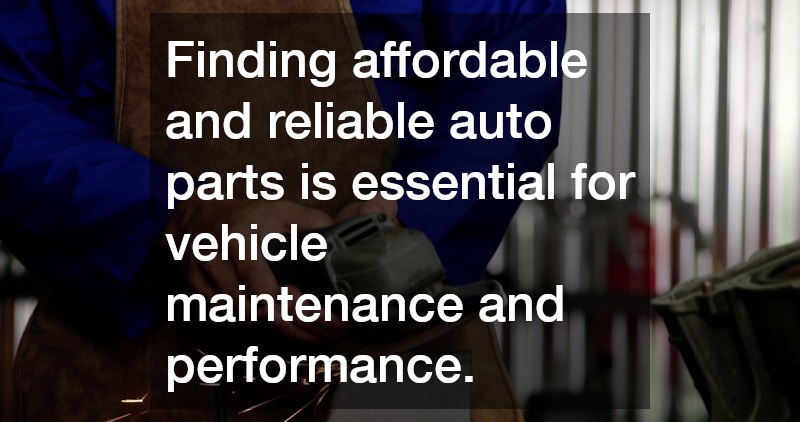
In this article, we explore the best ways to locate affordable and reliable auto parts in your vicinity. Whether you prefer purchasing online or visiting a local store, finding quality parts without breaking the bank is crucial for maintaining your vehicle. Let’s delve into some of the most commonly asked questions about sourcing auto parts effectively.
1. What Are the Best Online Platforms for Buying Auto Parts?
1.1 Comparing Prices and Reviews
Shopping online for auto parts offers the advantage of easily comparing prices across various platforms. By utilizing price comparison tools and reading product reviews, consumers can make well-informed decisions that suit their budget and requirements.
When looking for auto parts online, always check the reliability of customer feedback. Reviews not only reflect the quality and performance of the product but can also shine a light on any recurring issues experienced by previous buyers.
Using trusted websites like Amazon or eBay provides access to a wide array of reviews, which aid in evaluating product satisfaction and authenticity. Additionally, many online auto parts stores offer customer service that’s readily available to answer any queries before purchases are made.
1.2 Navigating Online Marketplaces
Understanding how to navigate online marketplaces like Amazon and eBay can greatly enhance your shopping experience. These platforms are equipped with search filters that allow you to pinpoint exactly what you need based on vehicle specifications and part compatibility.
Dedicated auto parts websites such as AutoZone or RockAuto specialize in parts and typically provide detailed product descriptions. This can aid in making sure you purchase the correct fit for your vehicle.
Furthermore, subscribing to newsletters from auto parts websites could provide insights into sales events and special discounts. This practice allows consumers to take advantage of price drops, making online purchases even more economical.
2. How to Choose Between Local Auto Part Stores and Big Box Retailers?
2.1 Benefits of Shopping at Local Auto Part Stores
There are numerous benefits to shopping at local auto parts stores, including personalized customer service. Local stores often have experts on staff who can give tailored advice based on individual vehicle needs and offer impeccable after-sales support.
Additionally, purchasing from nearby stores means saving on shipping fees and receiving parts more quickly. Moreover, supporting local businesses contributes to the community by boosting local economic health and job creation.
Local auto parts stores may also carry unique items that cater specifically to regional vehicle trends, providing customers with an edge over standardized options in chain stores. Involving local expertise ensures a better alignment with vehicle conditions because the advice stems from people familiar with the area’s driving needs.
2.2 Advantages of Purchasing from Big Box Retailers
On the other hand, big box retailers offer an extensive range of products, often at competitive prices which can be appealing for budget-conscious consumers. Their buying power allows them to source large quantities, leading to lower prices for customers.
The convenience factor cannot be understated as big box retailers are often located in accessible malls or shopping centers, combining shopping for different needs under one roof. Additionally, these larger stores frequently have clear return policies and customer-oriented satisfaction guarantees.
For many consumers, the reassurance of product availability and uniformity in big box retailer stores gives peace of mind, knowing that replacements or returns can be managed with ease. Moreover, their straightforward return policies enable hassle-free exchanges or refunds, which can be a deciding factor for many buyers.
3. What Are the Key Factors to Consider When Ensuring Product Reliability?
3.1 Understanding Quality Certifications and Standards
When purchasing auto parts, it’s crucial to understand quality certifications and standards that signify reliability. Some certifications to look for include ISO certifications that ensure a manufacturer’s adherence to quality management practices.
Further, OEM (Original Equipment Manufacturer) parts are typically held to the highest standards set by the original vehicle manufacturer, which can often guarantee compatibility and performance. These standards not only promise durability but also ensure that the parts meet safety compliance.
Being knowledgeable about these certifications assists consumers in making informed purchasing decisions, reducing the risk of acquiring subpar or incompatible parts. Additionally, certain certifications are recognized globally, which becomes handy when seeking particular parts across international online platforms.
3.2 Evaluating Manufacturer and Retailer Warranties
Another critical component of product reliability is the warranty offered by manufacturers and retailers. A comprehensive warranty can offer protection against defects and signal that a company stands behind its product quality.
Consumers should carefully assess the terms and conditions of these warranties, such as duration and extent of coverage, to gain maximum benefit. Some retailers also provide extended warranty options, which are worth considering for high-value parts.
Return policies complement warranties by providing an avenue for consumers to return defective parts with ease. Understanding these policies can ensure a smooth process in case the purchased part doesn’t meet expectations, leading to greater consumer satisfaction.
Finding affordable and reliable auto parts is essential for vehicle maintenance and performance. By exploring the best online platforms, evaluating the pros and cons of local stores and big box retailers, and understanding key factors of reliability, consumers can make informed purchasing decisions. Empower yourself with this knowledge to keep your vehicle running smoothly without overspending.

